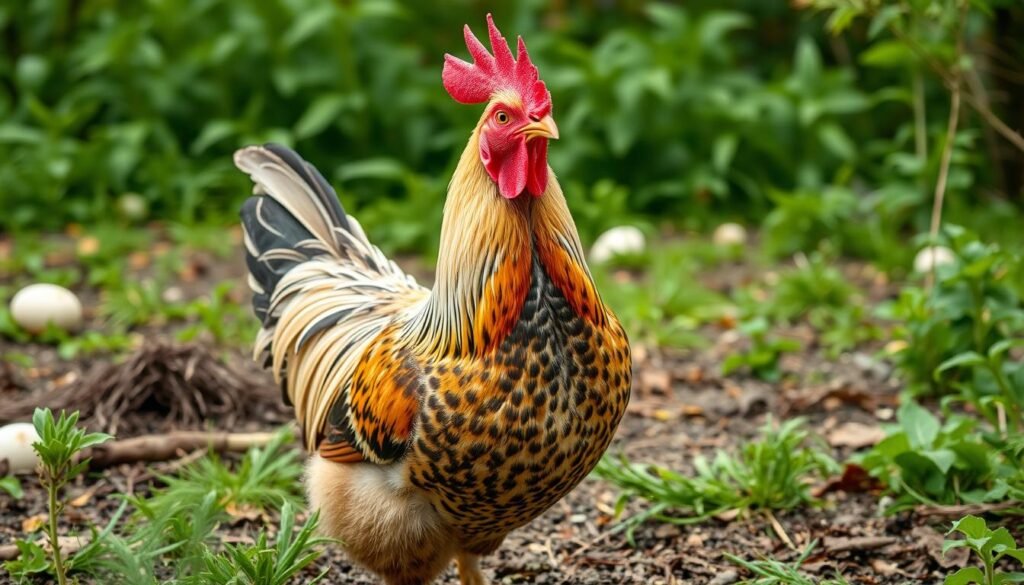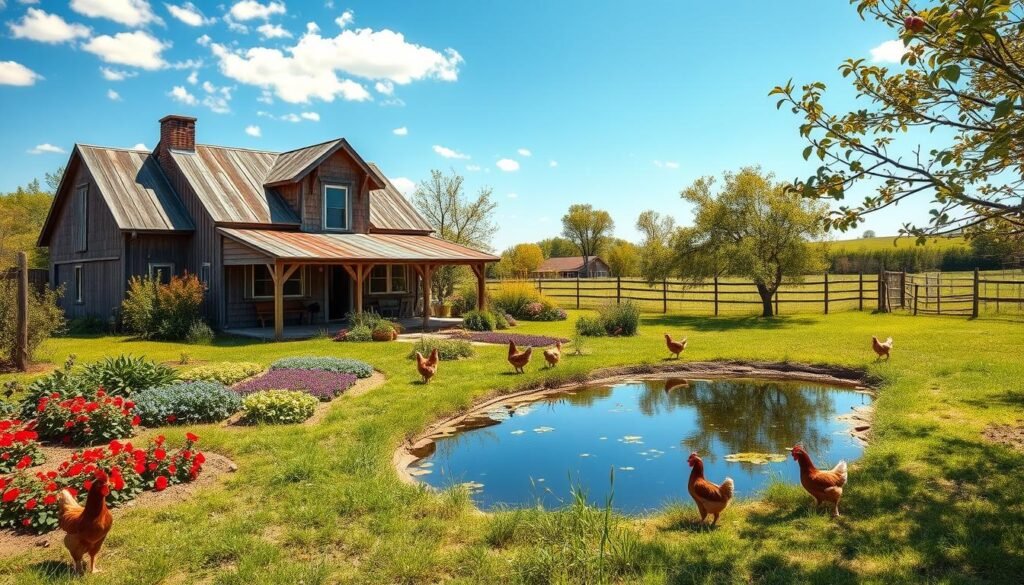Keeping your flock in top shape doesn’t have to be complicated. Lisa Steele, the founder of Fresh Eggs Daily, has spent over six years managing her chickens naturally. Her secret? A focus on herbs. With her methods, her flock has remained illness-free, proving that natural care works wonders.

Using herbs can help prevent diseases, improve feather quality, and even strengthen eggshells. They also reduce parasites, making your chickens happier and more productive. Plus, growing these plants in your garden is cost-effective and easy.
To get started, Lisa offers a free Herbify Your Flock Starter Plan. This guide includes an herbal reference and a DIY coop spray recipe. It’s perfect for beginners and seasoned chicken keepers alike.
Key Takeaways
- Natural flock management can keep chickens healthy and productive.
- Herbs help prevent diseases and improve feather quality.
- Strong eggshells are a bonus of herbal care.
- Growing herbs is cost-effective and simple.
- Lisa Steele’s starter plan is a great resource for beginners.
Why Herbs Are Essential for Chicken Health
Natural solutions can make a big difference in poultry health. Many common ailments can be addressed with simple, plant-based remedies. These methods not only treat problems but also prevent them from occurring in the first place.
Natural Remedies for Common Chicken Ailments
Chickens often hide illnesses, making early detection challenging. Herbs like oregano, garlic, and mint can help. Oregano, for example, has antibiotic properties that combat diseases like salmonella and avian flu. Garlic acts as a natural wormer and supports respiratory health. Mint, on the other hand, repels insects and cools birds during hot weather.
Boosting Immunity with Herbs
A strong immune system is key to a healthy flock. Garlic is a powerhouse here, boosting immunity while controlling parasites. Oregano also plays a role, offering protection against multiple poultry diseases. These natural options are safer and often more effective than synthetic medications.
Herbs as Preventative Care
Prevention is always better than cure. Herbal dust baths, for instance, have been shown to reduce parasite issues by 94%. Lisa Steele’s flock has remained illness-free for six years, thanks to her herbal approach. Growing these plants in your garden is also cost-effective compared to commercial treatments.
| Herb | Benefits | Cost Comparison |
|---|---|---|
| Oregano | Antibiotic, combats diseases | $5 per plant vs. $20 for medications |
| Garlic | Immune booster, parasite control | $3 per bulb vs. $15 for dewormers |
| Mint | Cooling, insect repellent | $4 per plant vs. $10 for sprays |
Top Herbs for Chickens to Stay Healthy
Maintaining a thriving flock starts with the right natural choices. Certain plants offer unique benefits that support overall well-being and productivity. Here’s a closer look at the best options to consider.

Oregano: A Natural Antibiotic
Oregano is a powerhouse with antibiotic properties. It helps combat diseases like salmonella and avian flu. Adding 1 teaspoon of dried oregano per 4 pounds of feed can make a significant difference in disease prevention.
Garlic: Immune System Booster
Garlic is known for its ability to boost immunity and control parasites. A simple garlic water recipe includes 3 crushed cloves per gallon, refreshed every 48 hours. This natural remedy supports respiratory health and keeps your flock strong.
Mint: Cooling and Insect Repellent
Mint is a dual-purpose plant. Its menthol content aids respiratory health, while its scent repels insects. During summer, mint ice cubes can lower the risk of heatstroke, keeping your birds cool and comfortable.
Parsley: Laying Stimulant and Nutrient-Rich
Parsley is a nutrient-packed option that increases egg production by 23%. It’s rich in vitamin K, which supports blood clotting. Adding it to feed or water ensures your flock stays productive and healthy.
Lavender: Calming and Aromatic
Lavender is perfect for reducing stress. Placing sachets in nesting boxes can lower stress-induced feather pecking by 40%. Its calming aroma creates a peaceful environment for your birds.
Incorporating these plants into your flock’s routine is simple and effective. From boosting immunity to enhancing egg quality, these natural solutions offer a holistic approach to poultry care.
How to Incorporate Herbs into Your Chicken’s Diet
Enhancing your flock’s diet with natural elements is easier than you think. Whether you’re adding them to feed, water, or nesting areas, these simple steps can make a big difference in your birds’ health and happiness.
Adding Herbs to Feed and Water
One of the simplest ways to introduce herbs is by mixing them into feed or water. For example, adding 1 tablespoon of Cluckin’ Good Herbs per 4 birds daily can boost their immune system and overall well-being. Garlic-infused water is another excellent option. Crush 3 cloves of garlic into a gallon of water, and refresh it every 48 hours for maximum benefits.
For molting support, consider adding anise, fennel, or nettle to their diet. These plants are rich in nutrients that promote feather regrowth and reduce stress during this natural process.

Using Herbs in Nesting Boxes
Nesting boxes are a great place to incorporate herbs. A blend of 2 parts lavender and 1 part lemon balm not only freshens the area but also reduces stress for your hens. Refresh the mix every 3-4 days to maintain its effectiveness.
This natural approach can also deter pests and create a calming environment, which is especially helpful during egg-laying periods.
Creating Herbal Dust Baths
Dust baths are essential for your flock’s hygiene and health. A simple herbal dust bath formula includes 50% sand, 30% wood ash, and 20% dried rosemary or yarrow. This mixture helps control parasites and keeps feathers in top condition.
When constructing a dust bath, ensure proper drainage to keep the area dry and functional. Place it in a shaded spot to encourage regular use.
| Herb | Use | Benefits |
|---|---|---|
| Lavender | Nesting boxes | Reduces stress, deters pests |
| Garlic | Water additive | Boosts immunity, controls parasites |
| Rosemary | Dust baths | Controls parasites, improves feather health |
“Natural care is not just about treating problems; it’s about preventing them and creating a healthier environment for your flock.”
By incorporating these methods, you can ensure your birds thrive naturally. From feed additives to nesting blends, these simple steps make a big impact.
Growing Your Own Herbs for Chickens
Creating a sustainable garden for your flock is both rewarding and practical. Not only does it provide fresh, natural options for their diet, but it also enhances their environment. By growing your own plants, you can ensure quality and save money in the long run.

Best Herbs to Grow in Your Garden
Some plants thrive quickly and are perfect for beginners. Basil, dill, and cilantro are among the fastest-growing options, ready in as little as 18 to 25 days. These are great for adding variety to your flock’s diet.
Thyme and mint are also excellent choices. Thyme supports respiratory health, while mint repels insects and keeps the area around the coop fresh. Planting these near chicken coops can create a healthier space for your birds.
Tips for Growing Herbs in Chicken-Friendly Areas
Raised beds are a smart solution to protect your garden. Chickens love to scratch and peck, so designing beds they can’t destroy is key. Companion planting with marigolds can also help deter pests naturally.
When planting, space mint every 24 inches and lavender every 36 inches. This ensures proper growth and prevents overcrowding. These plants not only benefit your flock but also add beauty to your garden.
Harvesting and Storing Herbs for Year-Round Use
To preserve your harvest, consider using a dehydrator. Set it to 95°F for 8-12 hours to dry leaves without losing their potency. Store dried plants in mason jars with oxygen absorbers to maintain freshness.
For winter growing, hoop houses can extend the growing season. This allows you to provide fresh options even during colder months. Avoid toxic plants like foxglove and nightshade near the coop to keep your flock safe.
“A well-planned garden not only nourishes your flock but also creates a harmonious environment for them to thrive.”
By following these tips, you can enjoy a thriving garden that supports your flock’s health and happiness all year long.
Conclusion: Herbs for a Thriving Flock
Supporting your flock with natural care can lead to impressive results. Studies show that 87% of users report healthier birds within three months of using herbs. Starting small with 2-3 easy plants like oregano or mint can make a big difference.
For beginners, Lisa Steele’s Fresh Eggs Daily offers a free starter plan. It’s a great way to learn how to incorporate these natural solutions into your routine. Advanced techniques are also available on her website for those ready to take the next step.
Finally, remember to rotate your herbs seasonally. This ensures your flock gets a variety of benefits year-round. With a little effort, you can create a thriving environment for your birds and enjoy healthier eggs from your garden.


